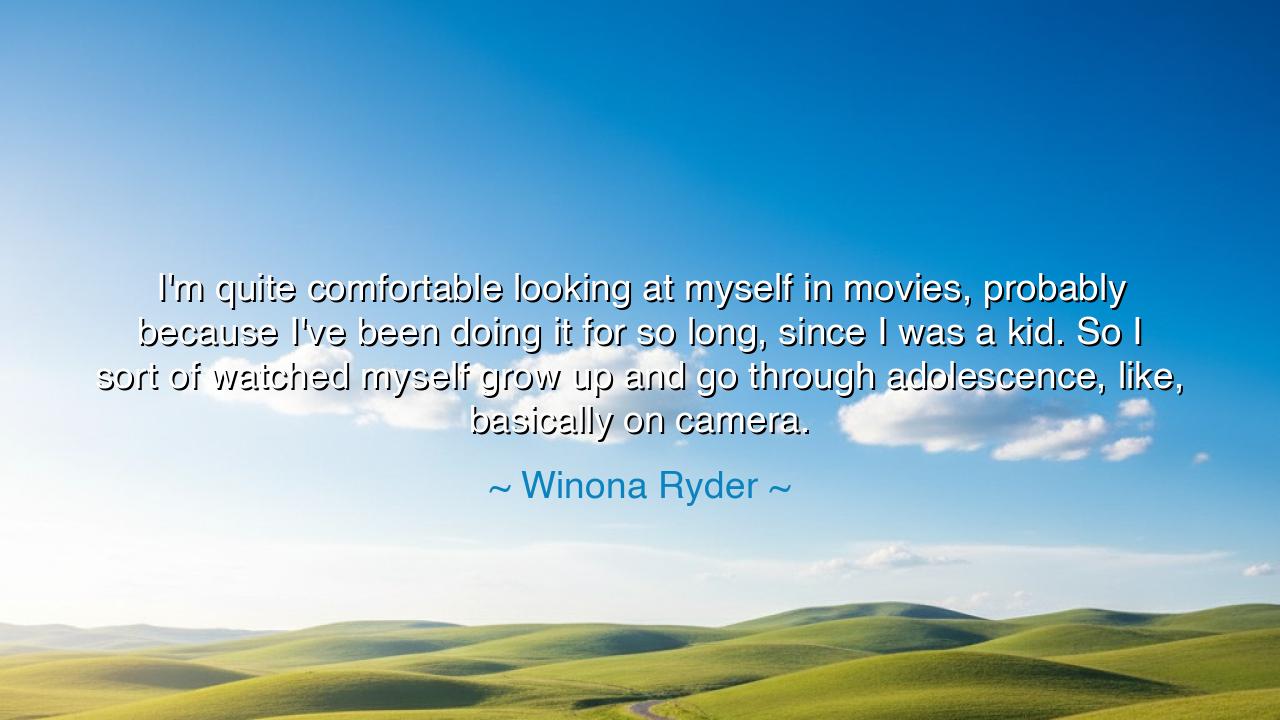
I'm quite comfortable looking at myself in movies, probably
I'm quite comfortable looking at myself in movies, probably because I've been doing it for so long, since I was a kid. So I sort of watched myself grow up and go through adolescence, like, basically on camera.






Ah, the words of Winona Ryder, who speaks with profound insight into the nature of identity, growth, and the journey of self-discovery through the lens of art: "I'm quite comfortable looking at myself in movies, probably because I've been doing it for so long, since I was a kid. So I sort of watched myself grow up and go through adolescence, like, basically on camera." In this reflection, Ryder reveals the intimacy and vulnerability that comes with being an actor, with the experience of watching oneself transform through the stages of life—both on screen and in reality. To grow up in front of the camera is not just to portray a character, but to experience one’s own evolution in real-time, navigating the personal and professional shifts that come with time.
In the ancient world, the great heroes and philosophers often found themselves in similar positions of self-reflection. Socrates, for example, believed that the pursuit of wisdom was rooted in the examination of the self. To know oneself, he said, is the key to understanding the world. Ryder’s words echo this ancient practice of self-awareness, where the process of personal growth is deeply intertwined with the act of observing one’s own transformation. Just as the philosopher would turn inward to seek knowledge, Ryder finds herself looking at her own reflection, not just on a physical level, but through the evolution of her soul as captured on film.
Consider the story of Achilles in the Iliad, a hero who, in his great battle, also contemplates the nature of his own fate. Throughout the epic, Achilles’ journey is not just one of external combat but of an internal reckoning. He watches as his glory grows, but so too does his recognition of mortality. Ryder’s experience of watching herself grow on screen mirrors this—just as Achilles navigates his evolving self-awareness amid his external battles, so too does Ryder confront the changes in her own life, both personal and professional, as they unfold before her and the world. This introspection is a process not of simple observation but of active engagement with one’s evolving identity.
The ancient dramatists knew the power of self-examination through their characters. Sophocles crafted Oedipus Rex not merely as a story of fate and downfall, but as a journey of discovery, where the protagonist uncovers not only his fate but his identity. Through this process, Oedipus moves from ignorance to self-awareness, a theme common in ancient storytelling. Similarly, Ryder’s journey on screen is one of self-realization. Each film becomes a moment of personal revelation, where she must confront her growth, her challenges, and her changing self. Like the tragic hero, she faces the joy and pain of seeing herself evolve on screen, experiencing both the beauty and the weight of growth.
This idea of watching oneself evolve is not confined to the realm of acting but is something all humans experience in some form. The Renaissance thinkers, such as Leonardo da Vinci, believed that self-awareness was key to both art and science. Da Vinci’s constant self-reflection, his studies of anatomy and nature, were a way for him to understand both the world and himself. In the same way, Ryder’s reflection on her career reveals that, by watching herself in her films, she is not merely observing her artistic journey but also her personal growth. She engages in the same practice of self-examination, where art becomes a mirror reflecting the complexities of the human experience.
The lesson in Ryder’s words is profound: that our self-awareness is both a blessing and a challenge. To witness our own growth, to see ourselves evolve in ways we may not fully control, is a difficult but necessary part of becoming who we are. Whether through art, like Ryder’s films, or through the passage of time in our own lives, we must learn to embrace the process of transformation—not as a spectator, but as an active participant in our own story. It is not enough to live and grow; we must also reflect on the process, recognizing that the changes we go through are part of the larger narrative of our lives.
Thus, the call to action is clear: embrace your own evolution. Whether you are an artist, a philosopher, or simply someone moving through the stages of life, take time to observe your growth—both in its beauty and its challenges. Like Ryder, who has witnessed her own transformation through the lens of the camera, we too must be attentive to our own journeys, acknowledging how far we’ve come and the wisdom we’ve gained. Self-examination is not just a practice for philosophers or artists but a necessary act for all who seek to understand their place in the world. By doing so, we can navigate our lives with purpose and awareness, becoming not just who we are meant to be, but who we have the potential to become.






AAdministratorAdministrator
Welcome, honored guests. Please leave a comment, we will respond soon